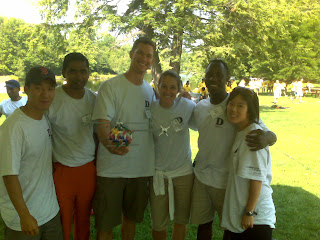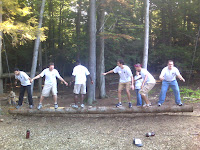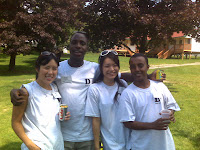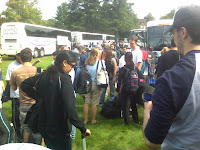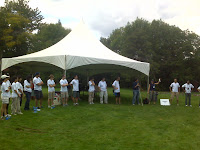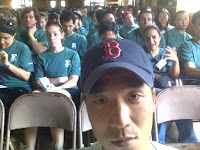어제 BusinessWeek에서 읽은 재미있는 기사를 공유하고자 한다. MBA 스쿨의 교수들이 점점 더 교실에서 가르치는 role을 벗어나서 유명한 superstar가 되고 있다는 글이다. 재미있게도 내가 아는 교수가 2명이나 언급된다. Stanford 대학의 Bob Sutton 교수, 그리고 아직 수업은 못 들었지만 유명한 Wharton의 Jeremy Siegel 교수이다.
Powerful Profs
As business schools gain visibility, star professors gain influence that extends outside the classroom to boardrooms, the best-seller lists, and beyond
by Dan Macsai
When Erik Lie began studying the influence of stock options on company behavior, he wasn’t searching for a scandal. Lie, a 38-year-old finance professor at the University of Iowa
, was just checking out a hunch. “It was a side project,” he recalls. “I wasn’t sure I’d find anything significant.”
And he didn’t—at first. But as Lie (rhymes with “free”) kept crunching numbers, he stumbled across some explosive data: Hundreds of companies appeared to be manipulating stock-option accounting rules for profit. A later study done with his research partner, Indiana University associate professor Randall Heron, puts the number at 2,000, or 29% of all public corporations (see BusinessWeek.com, 1/15/07, “He’s Making Hay as CEOs Squirm”).
Lie published his findings in 2005, and has since watched them tear through Corporate America. More than 100 companies, including United Healthcare (UNH) and Comverse Technology (CMVT), are now coping with civil charges and shareholder suits, and hundreds more face comprehensive investigations. Earlier this month, Gregory Reyes, former chief executive of Brocade Communications Systems (BRCD), was the first executive to fall: He was convicted of 10 counts of securities fraud.
Stars Are Born
As business schools have gained visibility, so, too, have their star professors. In recent years, innovative research from up-and-coming academics such as Lie has met with “unprecedented media interest,” says Hasan Pirkul, dean of the School of Management at the University of Texas at Dallas. Yet progress can be a double-edged sword: Though information now travels faster, there’s less opportunity to make a revolutionary breakthrough, says Pirkul (see BusinessWeek.com, “B-School All-Stars”).
During the 1960s and ’70s, business schools welcomed a series of founding fathers. Warren Bennis was the first to stress humanistic, democratic-style leadership, while Myron Scholes, who co-developed the Black-Scholes model, put forth a more effective way to price stock options. (It’s now the global standard in financial markets.)
Original Evolution
But now that B-schools’ major fields, such as finance, leadership, and management, have matured, says Pirkul, it’s more difficult to change the game. Robert Sutton, speaking specifically about management, elaborates: “There are probably no more original ideas,” says Sutton, who teaches at Stanford University’s Institute of Design. “To borrow something a colleague said, ‘The notion of uniqueness is a sign of ignorance or arrogance, or both.'”
Several authorities, including Pirkul, disagree with Sutton. Business school is evolving, they say, and evolution always makes way for a new generation of “founding fathers” and fresh thought. The University of Toronto’s Roger Martin, for example, is pioneering a design-oriented business philosophy. His theory—namely that, to succeed, corporate managers should become flexible problem-solvers, not sophisticated number-crunchers—is making waves worldwide.
Other newcomers, such as Lie, have benefited from the media’s rising obsession with scandal. Post-Enron, he says, research needs some level of “spiciness”—apart from its overall significance—to resonate with the general public. “That’s why my findings were covered,” he explains. “There was greed, law-breaking, tax flaws—all those ingredients we see in the movies.”
Making an Impact
One glance at two business school professors’ most buzzed-about books, Sutton’s The No Asshole Rule and Steven Levitt’s Freakonomics, reveals a similar truth. Sutton’s management guidebook, with its provocative title, is his best-selling effort to date. Freakonomics, co-authored with Stephen Dubner, applies economic theory to everyday phenomena (including dishonesty and drug dealing) and has moved more than 3 million copies worldwide.
Years ago, before business schools started attracting “the best and the brightest,” making such a pervasive impact—with or without sensationalism—was nearly impossible, says Jeremy Siegel, a finance professor at the University of Pennsylvania’s Wharton School. When Siegel attended college during the 1960s, B-schools were “looked down upon,” and they didn’t draw much general interest. “It was a much different world,” he recalls.
Today, Siegel says, B-school visibility is at an all-time high. Studies from Harvard Business School, Stanford’s Graduate School of Business, Wharton, and the like routinely draw media interest. In the last month, Wharton’s name was mentioned in more than 350 Google News stories worldwide. The B-school image, says Siegel, has “totally changed,” and it’s more powerful than ever.
So how, then, can B-school professors best affect today’s general public? With innovative strategy? Scandalous research? Book titles featuring words such as “asshole”? Perhaps Pirkul puts it best: “Outstanding discoveries will always make an impact.” Coming up with the right idea, in the right place, at the right time—that’s the hard part.
